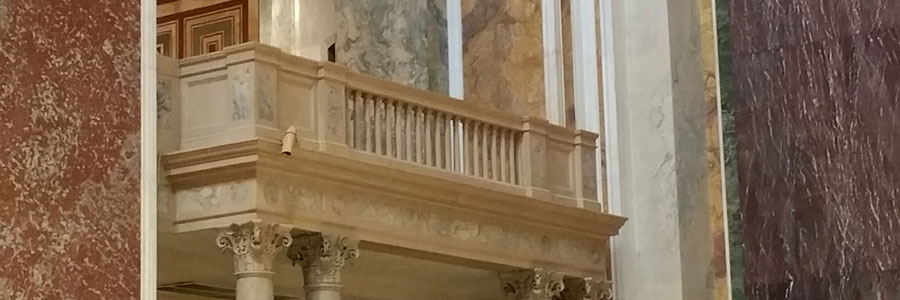Living a Sacred Life

Revelation is what one hopes for when attending a Lenten parish mission at a Roman Catholic church. A mystical vision might be a bit much to expect, but something more on the order of an intellectual realization is within reach. Attending a talk or Mass for several nights in a row can renew and refresh, and sometimes it can knock into place a connection in one’s contemplation of meaning, life, and God.
Such was the case when Fr. Jordan Zajac — a Dominican from Providence College — gave his first mission as an ordained priest for the joint parish of St. Christopher and St. Theresa in Tiverton.
The connection involved two compelling images that Fr. Zajac raised separately during his homily on the first night. He did not present them as thematically connected, but sometimes that’s how revelation happens: While cogitating about a theme, a speaker’s mind naturally pulls together related points, images, analogies, and metaphors. Receiving that collage on the background of his or her own cogitations, a listener spots a more-explicit line between two nodes.
The first image caught my attention in particular as a former carpenter. Fr. Zajac juxtaposed three masons at work. The first sees himself as simply laying bricks; he has a job. The second sets his line of sight more broadly, recognizing that he is helping to complete a project that, if done well, will lead to future engagements of similar or greater size and intricacy; he has a career. The third mason, even while side-by-side with the others doing the same work, contemplates the significance that this project is to build a church and that the people who utilize it will perhaps gaze upon the very bricks he has laid as they pray; he has a vocation. (In witness of their influence, I recall an essay that the builders of the Cathedral of Saint Matthew the Apostle in Washington, D.C., inspired in me.)
We are most fulfilled, Fr. Zajac was suggesting, when we find meaning in what we do.
Of course, his example is only illustrative; few people can manage to spend their lives laying bricks for churches. The rest of us must infuse meaning into whatever work we find ourselves doing. Even a mere job, for example, can be supportive of a family, which is an obvious source of meaning. A career extends that meaning to the benefit of an organization, as well as the community that it serves and the families whom it touches. A vocation incorporates all of this with the purpose of drawing people toward God.
The second revelatory image, raised some five or ten minutes later, drew attention to itself through the rhetorical device of humorous shock. Before it is consecrated, the species of the Eucharist are merely “some flat bread and,” Fr. Zajac said with a chuckle, “third-rate wine.” It takes the priest’s working of transubstantiation to make these mundane materials sacred.
The revelation to which this led me (and to which, admittedly, I may have been slow in coming) was that “sacred” and “meaningful” are synonymous in this context. Making our actions meaningful — properly being Christians — means sacramentalizing them. It means transubstantiating our lives, making Jesus truly present with us, in us, and through us. As the ritual of the Mass makes Jesus present in the Eucharist, the mason’s sense of vocation makes Christ present in his work.
Without the intention of being sectarian, the Catholic difference is significant, here. In the Catholic Church, the Eucharist is not just a symbolic breaking of bread; it really is the Body and Blood of our Lord. Just so, we should not merely imagine for our own benefit that our occupations and daily lives are meaningful. When we offer them up to Jesus, they really do connect us with his life and work. Our attitude moves from the symbolic offering of “I do my work in Jesus’ name” to the factual reality that “my work is his work, and he is doing his work through me.” The bumper-sticker question, “What would Jesus do?,” becomes, “What is Jesus doing through me?”
Because they approach such concepts from the point of view of the Church and theology, homilists and Christian writers going back to St. Paul — even Jesus — often drape them in frightening phrases like “dying to yourself.” On a subsequent evening, Fr. Zajac emphasized suffering. From the vantage point of the modern pew, however, this perspective has too much the off-putting sound of things you must do, when it really should be at the heart of Christianity’s attractiveness, as things you want.
That attraction can be — should be — more than a mature sense of delayed gratification based on faith that it will pay off. Even the great C.S. Lewis, in Mere Christianity, found himself having to address this point in a section titled “Counting the Cost”:
We were once rather like vegetables, and once rather like fish; it was only at a later stage that we became like human babies. And if we had been conscious at those earlier stages, I daresay we should have been quite contented to stay as vegetables or fish—should not have wanted to be made into babies.
But why should it be a cost? If evangelists ever could, we can no longer assume that the desirability of being a saint is self evident. Moderns are sufficiently conscious to be “quite contented to stay as vegetables or fish” if austerity and a gamble on life after death are the rewards of sainthood. Nobody can say with certainty what will happen to me after I die, so why should I hurry to die to myself while still alive? As St. Augustine put it, “O Lord, make me pure and holy; but not yet.”
To be sure, it’s easiest to see the value of God’s grace while suffering, and such times are when we need to feel Jesus’ presence most. Similarly, the act of giving up material goods as a tangible sacrifice shows others (and ourselves, most of all) that we aren’t merely mouthing comforting platitudes.
Logic might therefore lead us to want to make ourselves suffer in order to make connecting with God easier, and many saints have done so. Yet, there are risks, both of vanity and of overestimating our capacity. Like Pharisees in the street, we can fall into pride at how eager we are to suffer, and like Peter pledging to die with Christ, we can stumble on a promise that we shouldn’t have made.
And then, if you are offering up your suffering as a sacrifice to Jesus, what does it mean when you eagerly accept assistance or a new medicine that alleviates your suffering? Is that reneging on your offering? Such questions do have answers that are not rationalizations. After all, Abraham was going to offer Isaac to God, and God provided him a lamb instead. Importantly, the lamb didn’t float down to him in a cloud, but Abraham spotted it caught in a bramble. A cynic might present that as a convenient accident and say the same of a well-timed medical miracle.
How, then, do we know whether we’re accepting hardship as a pleasing sacrifice to God or rejecting His gifts in the name of suffering that He does not want for us? A focus on suffering can limit the scope of God’s grace and create a paradox and an obstacle.
In that way, Christianity begins to feel like a religion for the suffering, despite a faint voice saying, “I suffered so you don’t have to.” Perhaps a better phrasing would be that we might suffer, but we might not have to. Indeed, perhaps distinguishing between suffering and not suffering misses the point. Their transgression brought upon Adam and Eve embarrassment and pain they had not noticed before, but that doesn’t mean their bodily experiences had changed. Seeing things this way we could consider that, in order to redeem their sin, Jesus made suffering not suffering on the cross.
Our lives can be sacred and meaningful while we are not suffering, and by the same rule, when we make our lives sacred and meaningful, we are also less apt to see suffering as suffering when it comes. In such a life, the sacrifice is not so much deprivation in material terms (although that can be a useful catalyst) as it is relinquishment in spiritual terms: “I give this work (that is good, just, and done with love) and my experience of it over to God, whatever its material effects on me.”
The mystery of the Eucharist is that it is both bread and the Body. It is spiritual food, but as far as we know, our bodies still dissolve it and derive nourishment from it. Just so, when you sacrifice your life for God, you get to keep your life. You will have to give up that which is not good in it, but when you observe your fins and scales in the shadow of the cross, you desire nothing so much as to do so.
The critical distinction for evangelization, then, is that transubstantiating your life into a vocation brings meaning and joy, not suffering. People should turn their jobs into careers and careers into vocations because these are stages of fulfillment… of transcendence. Who could want more than that?


